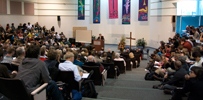Dennis Danielson on Paradise Lost
Abigail Harmon, Digital Marketing Coordinator for Regent College, recently asked Dennis Danielson, intellectual historian and Professor of English at the University of British Columbia, to talk about John Milton’s Paradise Lost. One of the foremost Milton scholars of the last fifty years, Dr. Danielson has written both the Cambridge Companion to Milton and a critically acclaimed Parallel Prose Edition of the poem published by Regent. He has taught Paradise Lost for over thirty years; this spring he will teach a course on Paradise Lost: The Poet, the Cosmos, and the Problem of Evil at Regent, June 2-6.
AH: You told a powerful story in your summer school video about how formative studying Paradise Lost for you was after the death of your sister. Could you talk a little bit more about your experience of the poem at that time?
DD: Often, powerful literature – or music, or art – affects a person most deeply when one’s defenses have been stripped away, when one is most emotionally “raw.” During the year after Lynn’s death I certainly did feel raw, and frankly not very kindly disposed to God. My favorite prof, who knew of my and my family’s loss, invited me to take his Milton course. And there I met Milton – with great passion, skill, and nerve – claiming he wanted to justify the ways of God to men. Well, I thought I needed the ways of God justified to me! So reading Paradise Lost gave me two things: a chance to think about something very personal but at the same time universally human (how “death [came] into the world / And all our woe”); and also an opportunity to think about sin, evil, temptation, along with God’s goodness and grace, “at arm’s length”: in a semi-real, semi-fictional story that was beautiful and intellectually satisfying, even if it couldn’t “explain” the loss I myself was grieving.
AH: How did that also influence your book, Milton’s Good God? There’s a sense of urgency that seemed to accompany writing it, that you needed to finish it. What did it mean to you?
DD: I felt there were things about Milton’s case for the goodness of God that were compelling enough and coherent enough that somebody needed to offer an overall study of Paradise Lost as a theodicy. Various critics and commentators had of course acknowledged this aspect of the epic, but no one had systematically aligned the epic with (a) historical attempts at theodicy and (b) discussions of the problem of evil within current philosophy of religion. I was excited at the prospect of being the guy who might set forth this case, and that excitement merged with the heartfelt longings I mentioned earlier. The writing process, when it goes right, actually feels like something with a will of its own, pulling the writer along with it. Milton might say that, sometimes, a writer can hear the Muse singing and just has to sing along!
AH: You said that Paradise Lost can “exercise the muscles of doubt, belief, curiosity, wonder.” What’s one of the most salient moments in the poem for you that causes you to deeply experience one of these emotions?
DD: Ooh, there are lots of these! In the invocation to Book 3 of Paradise Lost, the hymn to Holy Light, Milton conveys his sense of having crossed the threshold from hell and darkness (which is where the poem begins) to the realms of heavenly light. In the story, Satan is making that journey; Milton as the narrator is making that journey; and you or I as a reader make that journey too. Moreover, you can sense that Milton is pretty depressed at having had to endure all that darkness; I feel it myself when I get to this point in the poem. But to make matters worse, Milton points out that he is literally blind. You and I might be only figuratively blind, but like Milton we are utterly incapable of rising to the realms of glory by means of our own faculties: we need divine help; we require the implantation of “new eyes.” So this realization can be a moment of great doubt and despair – except, of course, for the reality of God’s light and God’s grace. So this kind of experience can really combine doubt, belief, curiosity, and wonder.
AH: Your prose version of Paradise Lost is widely regarded as a wonderfully meticulous and “powerful pedagogical tool that is a gift to any teacher of Milton” by the likes of Stanley Fish. I’m fascinated by what this process was like for you. What was the best and the hardest part of spending so much time with every detail of the poem?
DD: The best part was getting to walk Milton’s journey with him, step by step (as illustrated in my previous answer), and having to grapple with every word and phrase, not just the ones I found easy to understand in the first place. The hardest part was having to grapple with every word and phrase, not just the ones I found easy to understand in the first place!
AH: Do you think that every able reader should read Paradise Lost? Why is it a seminal classic?
DD: I don’t usually tell people what they should read – unless they've enrolled in one of my classes, and then I’ll tell them! Seriously, though, to read Paradise Lost is to engage, to enjoy, and maybe to worry about, one of the most powerful and formative stories of all time. Paradise Lost is of course only one take on the story of the Fall and of Adam and Eve. But when you think how foundational that story and these characters –Christ himself is referred to by the Apostle Paul as “the last Adam”; Eve became an image of the Church, the rescued bride, etc. – you might well want to think more deeply about what it all means. Furthermore, Milton profoundly influenced subsequent writers from Blake and the Romantic poets up to C. S. Lewis and Phillip Pullman. The seeds implied by your word “seminal” have been amazingly widely scattered. It’s both fun and instructive to learn to recognize the fruit that has sprung from them. These are of course theological, spiritual, and literary reasons for reading Paradise Lost. But it is also very, very beautiful.
Interested in knowing more? Watch a preview of Dennis Danielson's summer course at Regent, Paradise Lost: The Poet, the Cosmos, and the Problem of Evil.




